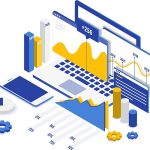Customer experience is everything. Recent research has revealed that 90 percent of buyers are willing to pay a premium for better customer experience. The key is understanding what an improved experience actually means for a customer, however. The rise of analytics has positioned companies to achieve closer customer analysis ”on a far greater scale than feedback surveys or … [Read more...] about How To Use Big Data to Improve Your Customer Service
Big Data
Learn everything you need to know about big data. Find out how companies are using this revolutionary technology and what it means for your business strategy.
How to Increase Diversity in the Tech Workplace
Diversity in the workplace is something that all tech companies should strive for. When appropriately embraced in the tech sector, diversity has been shown to increase financial performance, increase employee retention, foster innovation, and help teams to develop better products. For example, data marketing teams that have equitable hiring practices in regards to gender … [Read more...] about How to Increase Diversity in the Tech Workplace
6 Data Analytics and Business Intelligence Trends to Fire Up Your Business
There is only one boss. The Customer. And he can fire everybody in the company from the chairman on down, simply by spending his money somewhere else. “ Sam Walton. Every good company can survive only providing excellent customer service. But with the evolution of technology on a day to day basis, the customer expectations are soaring high. Hence to balance it with other … [Read more...] about 6 Data Analytics and Business Intelligence Trends to Fire Up Your Business
Why The Future of Finance Is Data Science
The entire process of working is going through fast changes with every advance in technology. Top financial advisors and leaders now see the future completely reliant on data science. Automation is occurring in all industries, and while some jobs will become streamlined, that does not necessarily mean lowering the number of employees. With new technology, people need to … [Read more...] about Why The Future of Finance Is Data Science
How Big Data Could Change Environmental Reporting
Data is everywhere today and in every industry ” and it's remaking how we manufacture products, construct homes and buildings, feed ourselves, manage our resources and much more. Big data is also the key to improving the way we conduct environmental studies and engage in environmental reporting for the purposes of regulatory compliance ” and, ultimately, the key to making … [Read more...] about How Big Data Could Change Environmental Reporting
What is big data?
Big data is a term that refers to the massive amount of digital data created and shared every day. Big data can transform how we live, work, and communicate. It can be used to improve everything from public health and urban planning to business and marketing.
Big data is also changing the way we think about privacy and security. The volume, velocity, and variety of big data present challenges and opportunities for organizations and individuals. Regardless, big data is here to stay, and its impact will only continue to grow in the years to come.
What is big data analytics?
Big data analytics is the process of turning large, complex data sets into actionable insights. Businesses use various analytical tools and techniques, including machine learning and statistical analysis, to do this.
Big data analytics can be used to improve decision-making in areas like marketing, operations, and customer service. It can also be used to identify new business opportunities and optimize existing processes. With the help of big data analysis, businesses can gain a competitive edge by using their data better.
Want to learn more about big data? Datafloq has courses available. Contact us to get started.
When was big data introduced?
The term big data was coined in the 1990s, with some giving credit to John Mashey for popularizing the term. However, the concept of big data has been around for much longer.
Where does big data come from?
In the early days of computing, scientists and businesses began to realize that the amount of data being generated was increasing exponentially. As a result, they began to develop new methods for storing and processing data.
Over time, these methods have become increasingly sophisticated and have played a key role in enabling businesses to make sense of vast amounts of information. Today, big data is used in various industries, from retail to healthcare, and its importance is only likely to grow in the years to come.
What are examples of big data?
One of the most common examples of big data is social media data. With over 2 billion active users, Facebook generates a huge amount of data every day. This includes information on user interactions, posts, and even location data. Analyzing this data can help companies better understand their customers and target their marketing efforts.
Another example of big data is GPS signals. These signals are constantly being generated by devices like cell phones and fitness trackers. When combined with other data sets, GPS signals can be used to provide insights into everything from traffic patterns to human behavior. Finally, weather patterns are another type of big data set. By tracking these patterns over time, scientists can better understand the impact of climate change and develop strategies for mitigating its effects.
How do companies use big data?
Companies use big data in marketing, product development, and customer service. By analyzing large data sets, businesses can identify patterns and trends that would be otherwise difficult to spot. For example, a company might use big data to track customer behavior patterns to improve its marketing efforts.
Alternatively, a company might use big data to improve its products by identifying areas where customers are most likely to experience problems. For instance, big data can be used to improve customer service by finding pain points in the customer journey. Ultimately, big data provides companies with a valuable tool for gaining insights into their business operations.






